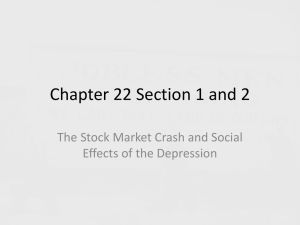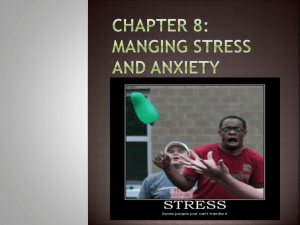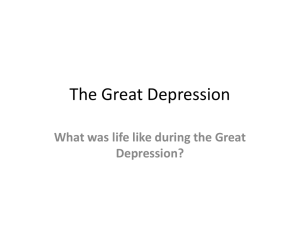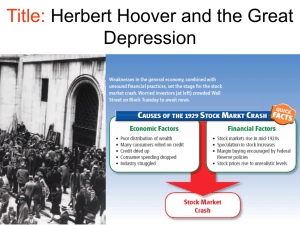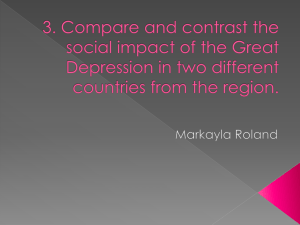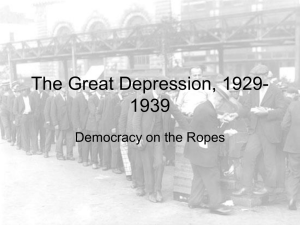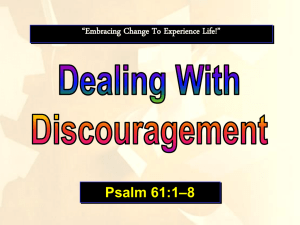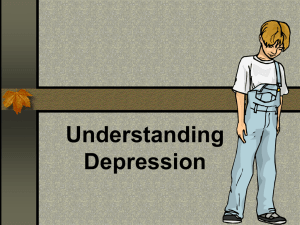Lesson 7 - Hope Against Depression
advertisement
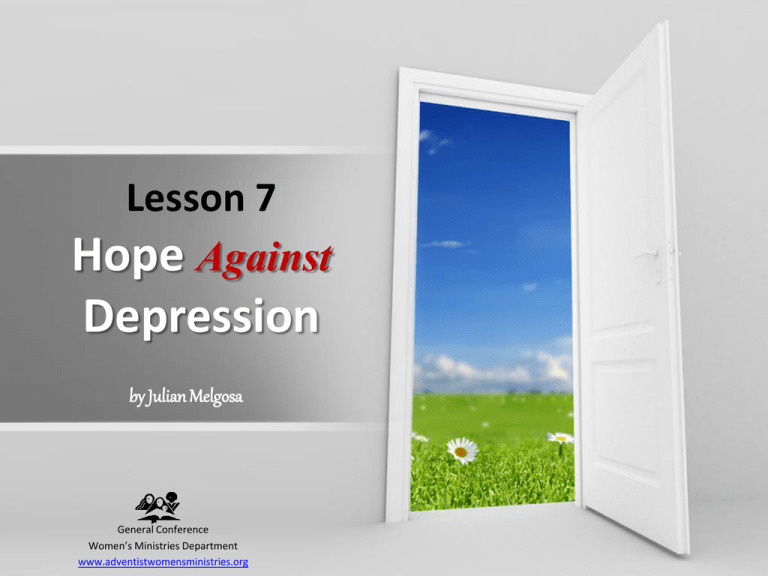
Lesson 7 Hope Against Depression by Julian Melgosa General Conference Women’s Ministries Department www.adventistwomensministries.org Memory Text: • “The Lord is close to the brokenhearted and saves those who are crushed in spirit” Psalm 34:18, NIV • Depression, or extreme discouragement to the point of becoming disabled, has been experienced since the inception of sin. • Hopelessness is a symptom of depression, and the biblical message of hope can offer us so much in contrast to a world that offers so little. All people, at times, face moments of extreme discouragement for any variety of reasons. • No wonder, then, that the Word of God is filled with promises that can give all of us, no matter our situation, reasons to hope for a better future, if not in this world then certainly in the next. The Downcast Soul • Read Psalm 42. How can you relate to what’s being expressed there? What hope is offered? • When one sees oneself negatively (“I am dumb”), looks at the world pessimistically (“life is always unfair”), and contemplates the future hopelessly (“it will never improve”), chances of depression become high. This attitude is called “catastrophic thinking.” Consider the following alternatives: • How to look at yourself. You were created in God’s image, to rule over creation (Gen. 1:26, 27). • The world. It is true that the world is rotten and full of evil. At the same time, there also are many right, noble, and admirable things (Phil. 4:8) to ponder upon. • The future. What a wonderful future is reserved for God’s children! The Bible is full of promises with the assurance of salvation (Ps. 37:39). The Consequences of Discouragement • “ ‘I cried like a swift or thrush, I moaned like a mourning dove. My eyes grew weak as I looked to the heavens. I am troubled; O Lord, come to my aid!’ ” (Isa. 38:14, NIV). • People in certain contexts suffer in silence, avoiding any obvious or visible complaint. Others (like Hezekiah) use moaning and wailing when going through sorrow. There also are personal differences; some people are able to approach death with more tranquility than others can. What symptoms are expressed in the following texts? • Ps. 31:10 • Ps. 77:4 • Ps. 102:4, 5 • 1 Kings 19:4 Depression causes a variety of painful manifestations • (a) a deep sense of sadness (sorrow), • (b) a lack of motivation to do anything, even enjoyable activities, • (c) a change in appetite and either weight loss or gain, • (d) sleep disturbances, sleeping either not enough or too much, • (e) feelings of low self-esteem, • (f) poor reasoning and memory, and • (g) thoughts of death and suicide. • We all suffer sadness and discouragement in one form or another for one reason or another at one time or another. What things bring you down and why? Recall incidents of God’s past guidance in your life. What hope and encouragement can you draw from remembering the Lord’s leading? Why is it important to keep those memories alive? • Relief From Depression • Read Psalm 39:2–7. What happened when David remained silent? And what was the result of his speaking up? • Like most emotional disorders, depression necessitates that the sufferer speak about his or her struggles. This act alone can begin to initiate healing. • A basic coping strategy for depression consists of talking to a friend (or a therapist) who knows how to listen and, even better, who knows how to help access more intensive resources, if needed. There is a healing effect in verbalizing thoughts and feelings. The Need for Forgiveness • How did David find relief to his agony? Ps. 32:1–5; see also 1 John 1:9. How can we find this same thing for ourselves? • The guilt produced by unconfessed sins may become extremely painful. The expressions used by David are a clear indication of intense, inward pain. Psalm 32 and other passages in Psalms show the severity of David’s emotional distress. • We can’t undo the past; what we can do, by God’s grace, is seek to learn from our past mistakes and, to whatever degree possible, make restitution for whatever wrong we have done. After all, all we can do is surrender to God and seek His mercy, grace, and healing. Hope Against Distress • Highly defective interpersonal relationships cause much stress and are associated with depression. Clearly stated by Micah (vs. 7), the conclusive ingredient to survive in the middle of a crisis is hope. • Hope is essential to live our lives with a reasonable amount of mental health. • Hoping for Jesus’ return helps us to gain perspective over the many unpleasant things that surround us and allows us to look in confidence toward eternity. • One of the greatest mistakes a person can make is to believe that because they feel so down, so depressed, so hopeless, it means that God has abandoned them. Why is that, first of all, not true? • What Bible characters (such as Elijah, Jeremiah in jail, John the Baptist in jail, Jesus in Gethsemane) can you point them to in order to show them that sadness and discouragement do not mean God has forsaken them? • How can you help them learn that feelings are not a good barometer of faith?

